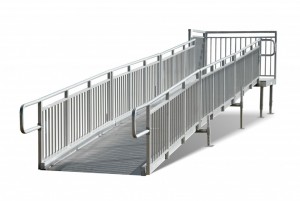An aluminum wheelchair ramp with handrails from REDD Team is the perfect choice to meet your accessibility system needs. Aluminum has advantages over any other material you could imagine, including steel, wood and concrete. We offer ramps, handrails, walkways, pedestrian bridges, stairs and more, and all of them are in total compliance with all ADA (Americans With Disabilities Act) mandates. No matter what your requirements may be, we’ll have the expertise and experience to meet them.
The Secret of Our Strength – 6000 Series Alloys
 When we say our aluminum is stronger than steel skeptics will immediately roll their eyes. How could something you could easily crush with one hand, like an aluminum soda can, be that strong? The reason we can make that bold claim is the special 6000 series aluminum alloys we use in all of our products.
When we say our aluminum is stronger than steel skeptics will immediately roll their eyes. How could something you could easily crush with one hand, like an aluminum soda can, be that strong? The reason we can make that bold claim is the special 6000 series aluminum alloys we use in all of our products.
These alloys provide incredible strength – making our aluminum a great substitute for steel. Not only is our aluminum strong, it’s also extremely durable. It’s also very easy to join and weld, and will keep its shape no matter how hot or cold the outside temperatures can get. In fact, when the outside air gets colder, our aluminum actually gets even stronger.
Our alloys provide an amazing amount of flexibility, allowing us to form our aluminum into just about any conceivable shape. That makes it the perfect material for all of the accessibility system components we manufacture. It’s also offers a high level of resistance to corrosion and rust, making it perfect for marine applications.
Other Advantages of Aluminum Versus Steel
In addition to durability, aluminum provides many other advantages over aluminum. Here are just a few.
- Steel is extremely heavy – three times as heavy as aluminum. As a result, it’s much more expensive to not only purchase but also to ship. It’s also much more difficult to move than our aluminum products.
- Steel ramps typically consist of joints that can become damaged when the soil shifts. Our ramps aren’t attached to the ground, so they’re not affected in the least.
- In order to stand up to the elements, steel has to be treated with very expensive substances. If it’s not, it will eventually develop corrosion and rust. Not only is this unsightly, it also threatens the structural integrity of a steel ramp. Aluminum won’t degrade, so it will be safe to use for years and years.
- When the outside temperatures are extremely hot or cold, steel can be dangerous to touch. Aluminum, on the other hand, is an excellent thermal conductor. You can touch it without even the least amount of discomfort, regardless of what the temperature may be.
Aluminum Versus Wood
Another material commonly used in ramps is wood. But aluminum beats this material in several ways as well, including the following.
- Unless coated on a regular basis, wood will eventually warp and then rot. Aluminum doesn’t need any maintenance, and will always provide sure footing even on the rainiest days.
- As with steel, the joints used to make wooden ramps can loosen due to ground shifts. Aluminum, as you learned earlier, doesn’t have this problem.
- Wood will also shrink and expand as the seasons change. Aluminum will always retain its shape, remaining solid and strong day after day.
Learn more about the benefits of a REDD Team aluminum wheelchair ramp with handrails by calling (800) 648-3696 or contacting us online.

